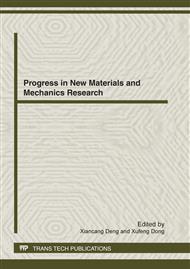p.330
p.335
p.342
p.351
p.355
p.360
p.369
p.376
p.381
Study of Torsion Spring’s Parameters with Angular Type Grippers
Abstract:
Angular type grippers are proper to grip the small size material than linear type grippers (clamping). It is due to the grip force of angular type grippers separates to the normal and the opposite directional force to gravity forces, when the contact between the gripper tip and the gripped material occurs. Whereas, the linear type gripper with prismatic joint has only normal forces. Therefore, even less gripping force of angular type grippers than linear type can generate slip-less pick-and-place motions. But this angular type gripper has some restrictions. For generating the opposite direction force to gravity forces, it is necessary that the length between each angular joint position is larger than the length of gripped materials. This should be considered on the design step of angular type grippers. Otherwise, the gripping force separates to the normal and the same directional force to gravity forces. The other restriction is that the tip of gripper must have passive joint or active joint for the plane-to-plane contact between faces of gripped material and gripper tip, for getting the high frictional coefficient. In this paper, we describe the case of adaptation of passive joint. This leads simpler implementation than the active joint. Especially, we focus on the torsional spring deposed at between jaw link and tip as the passive joint, with effects of design parameters of this torsional spring such as the torsional stiffness and preload with multi-body dynamics simulation.
Info:
Periodical:
Pages:
355-359
DOI:
Citation:
Online since:
April 2012
Authors:
Keywords:
Price:
Сopyright:
© 2012 Trans Tech Publications Ltd. All Rights Reserved
Share:
Citation:


